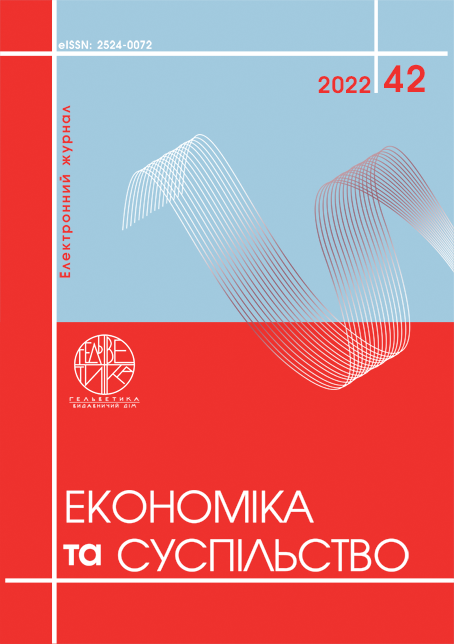IMPACT OF GLOBAL CRISIS ON THE DEVELOPMENT OF INTERNATIONAL TOURISM IN EU COUNTRIES
Abstract
The economic crisis is an important event that affects the development of various directions. The types of crises are diverse and have several subcategories. The tourism crises reported in academic research are mainly in Asia, Europe and North America and reflect their real-world prevalence. The impact of crises has three levels: macro, meso and micro. Synergistic factors can strengthen or weaken the degree of crisis impacts, which include positive, negative and interacting factors. The increase in the number of international tourists is increased by stable regions in which favorable conditions for the development of tourism are created and maintained. The nature of the tourism industry depends on many external factors, which makes it vulnerable. Tourism crisis is not necessarily sudden or unexpected. It is important to highlight the theory of crises in international tourism and their impact on the development of the EU economy. The thematic analysis of the papers highlights the diversity of the contexts of crises and the research approaches. Social and political events affecting tourism include crime, politically motivated unrest, terrorism, war and human rights abuses. There is growing concern when threats are generated by external influences, especially when this is compounded by internal unrest. Health-related crises that have recently affected tourism include bird flu, SARS, salmonella, Ebola and COVID-19. International conflicts occurring in different countries have a significant negative impact on tourism, since the tourism industry for the vast majority of tourists (not including the organization of extreme and business tours) involves providing comfort. Tourism demand is dependent on natural disasters, economic crises, terrorism, crime, ethnic conflicts and political instability, so studying the relationships between tourism and related economic parameters is critical to establishing effective management plans. The potential impact of crisis events on international tourism is likely to increase in both magnitude and frequency as international tourism becomes increasingly mobile and interconnected.
References
McMullan, Caroline. (1997). Crisis: When Does a Molehill Become a Mountain? Disaster Prevention and Management. URL: https://www.researchgate.net/publication/241708400_Crisis_When_Does_a_Molehill_Become_a_Mountain/citation/download
Dobson, John. (2008). Tourism crises: management responses and theoretical insight, E. Laws, B. Prideaux (Eds.). The Haworth Hospitality Press, New York (160pp), 2005, ISBN: 0-7890-3208-2. Tourism Management.
Susanne Becken, Emma Whittlesea, Johanna Loehr & Daniel Scott (2020) Tourism and climate change: evaluating the extent of policy integration, Journal of Sustainable Tourism, 28:10, 1603-1624.
Amelung B, Moreno A, authors Szabo L, Ciscar Martinez J, editors. Impacts of climate change in tourism in Europe. PESETA-Tourism study. EUR 24114 EN. Luxembourg (Luxembourg): Publications Office of the European Union; 2009. JRC55392.
The Impact of Terrorism on European Tourism. Shaen Corbeta∗, John F. O’Connellb, Marina Efthymioua, Cathal Guiomarda, Brian Luceyc,d,e. URL: https://www.readcube.com/articles/10.2139%2Fssrn.3454220
Шмыткова А. В., Чечётенко Ю. С. Влияние геополитической обстановки на развитие туризма на ближнем востоке в XXI веке. Научный вестник. 2017. № 2-3(14-15). С. 57–65.
Hall, C. M., Scott, D., & Gossling, S. (2020). Pandemics, transformations and tourism: Be careful what you wish for. Tourism Geographies, vol. 22(3), pp. 577–598.
McMullan, Caroline. (1997). Crisis: When Does a Molehill Become a Mountain? Disaster Prevention and Management. Available at: https://www.researchgate.net/publication/241708400_Crisis_When_Does_a_Molehill_Become_a_Mountain/citation/download
Dobson, John. (2008). Tourism crises: management responses and theoretical insight, E. Laws, B. Prideaux (Eds.). The Haworth Hospitality Press, New York (160pp), 2005, ISBN: 0-7890-3208-2. Tourism Management
Susanne Becken, Emma Whittlesea, Johanna Loehr & Daniel Scott (2020) Tourism and climate change: evaluating the extent of policy integration, Journal of Sustainable Tourism, 28:10, 1603–1624
Amelung B, Moreno A, authors Szabo L, Ciscar Martinez J, editors. Impacts of climate change in tourism in Europe. PESETA-Tourism study. EUR 24114 EN. Luxembourg (Luxembourg): Publications Office of the European Union; 2009. JRC55392
The Impact of Terrorism on European Tourism. Shaen Corbeta∗, John F. O’Connellb, Marina Efthymioua, Cathal Guiomarda, Brian Luceyc,d,e. Available at: https://www.readcube.com/articles/10.2139%2Fssrn.3454220
Shmytkova A.V., Chechetenko Y.S. (2017) Vliyanie geopoliticheskoy obstanovki na razvitie turizma na blizhnem vostoke v XXI veke [The influence of the geopolitical situation on the development of tourism in the Middle East in the 21st century]. Scientifc Herald, vol, 2–3(14–15), рр. 57–65.
Hall, C. M., Scott, D., & Gossling, S. (2020). Pandemics, transformations and tourism: Be careful what you wish for. Tourism Geographies, vol. 22(3), pp. 577–598.


